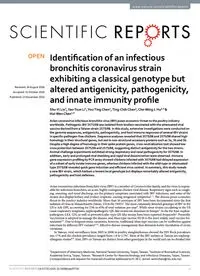
2016 Identification of an infectious bronchitis coronavirus strain exhibiting a classical genotype but altered antigenic PDF
Preview 2016 Identification of an infectious bronchitis coronavirus strain exhibiting a classical genotype but altered antigenic
1 Scientific RepoRts | 6:37725 | DOI: 10.1038/srep37725 www.nature.com/scientificreports Identification of an infectious bronchitis coronavirus strain exhibiting a classical genotype but altered antigenicity, pathogenicity, and innate immunity profile Shu-Yi Lin1, Yao-Tsun Li1, You-Ting Chen1, Ting-Chih Chen1, Che-Ming J. Hu2,3 & Hui-Wen Chen1,3 Avian coronavirus infectious bronchitis virus (IBV) poses economic threat to the poultry industry worldwide. Pathogenic IBV 3575/08 was isolated from broilers vaccinated with the attenuated viral vaccine derived from a Taiwan strain 2575/98. In this study, extensive investigations were conducted on the genome sequences, antigenicity, pathogenicity, and host immune responses of several IBV strains in specific-pathogen-free chickens. Sequence analyses revealed that 3575/08 and 2575/98 shared high homology in their structural genes, but not in non-structural accessory proteins such as 3a, 3b and 5b. Despite a high degree of homology in their spike protein genes, cross neutralization test showed low cross protection between 3575/08 and 2575/98, suggesting distinct antigenicity for the two strains. Animal challenge experiments exhibited strong respiratory and renal pathogenicity for 3575/08. In addition, early and prolonged viral shedding and rapid viral dissemination were observed. Immune gene expression profiling by PCR array showed chickens infected with 3575/08 had delayed expression of a subset of early innate immune genes, whereas chickens infected with the wild-type or attenuated- type 2575/08 revealed quick gene induction and efficient virus control. In summary, this study reveals a new IBV strain, which harbors a known local genotype but displays remarkably altered antigenicity, pathogenicity and host defenses. Avian coronavirus infectious bronchitis virus (IBV) is a member of Coronaviridae family, and the virus is respon- sible for infectious bronchitis, an acute, highly contagious chicken viral disease. Respiratory signs such as cough- ing, sneezing, and nasal discharge are the primary symptoms associated with IBV infections, and some of the strains also display kidney and oviduct tropisms, causing urogenital symptoms1–3. The disease poses economic threat to the poultry industry worldwide. More than 50 serotypes of IBV have been documented since the first isolation of virus in Massachusetts (Mass), US in the 1930 s2. The most commonly detected genotype of IBV in the US is Ark-DPI, accounting for 23% to 65% of total isolation per year4. While most strains circulating in the US cause respiratory symptoms, nephropathogenic QX-like strains are dominant in Europe2. In the Far East, nephro- pathogenic LX4, LDL as well as proventricular-type QX-like strains have been reported frequently2. Presently, vaccination is adopted to manage the disease, and Mass type vaccine H120 is the most widely used vaccine for- mulation2,5. Due to frequent strain variations, however, traditional Mass type vaccines can be ineffective against infections by different IBV variants2,5,6. Effective disease management thus demands better elucidation of strain variations. In Taiwan, viral surveillance from 2005 to 2006 in poultry slaughterhouses showed the IBV flock prevalence was 17% and the chicken prevalence ranged from 1.8 to 3.7%7. Most of the IBV isolates in Taiwan are nephrop- athogenic strains8,9. Also, IBVs in Taiwan are distinct from other genotypes in the world and can be divided into 1Department of Veterinary Medicine, National Taiwan University, Taipei, Taiwan. 2Institute of Biomedical Sciences, Academia Sinica, Taipei, Taiwan. 3Research Center for Nanotechnology and Infectious Diseases, Taipei, Taiwan. Correspondence and requests for materials should be addressed to H.-W.C. (email:
